Every Paul Verhoeven Movie Ranked From Worst To Best
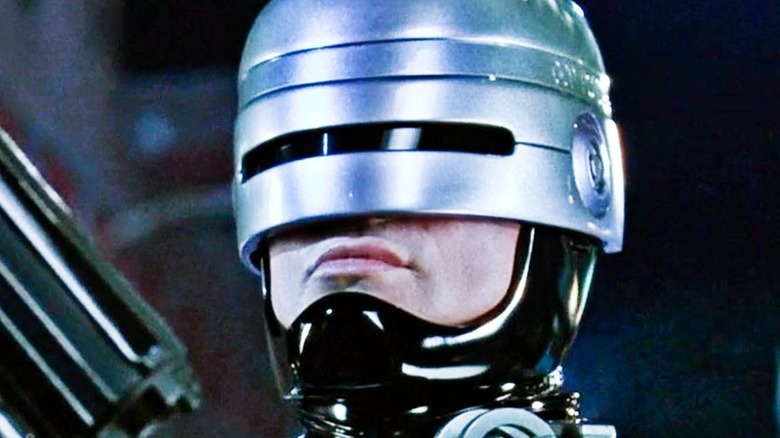
There are many words that you can use to define Paul Verhoeven's work. While "sex" and "violence" are the obvious ones, for me, the most fitting is "glee." Watching a Verhoeven film is like picturing the director giggling as he comes up with outrageous images and sequences that seem guaranteed to make some viewers angry. His films touch upon different topics and genres, but often feature characters on the cusp of something great, whether they're spies in danger or would-be showgirls. Verhoeven's films have an abundance of everything. He asks his actors to go the extra mile to get the types of performances he wants; the results can be great, or they can live in infamy for years to come. Either way, in Verhoeven's work, his craft is the star.
An article on Verhoeven's films could spend thousands of words on their most notorious qualities: their blood-soaked scenes, their graphic eroticism, and the sensational setpieces that eclipse the quieter and more introspective moments, which are surprisingly plentiful. And yet, Verhoeven's films also feature women with complex motivations who often outshine the male characters. In his oeuvre, there are blockbusters with sad and hopeless heroes, and films that toe the line between art and pornography. Once you look past the surface, you're left with a robust filmography, one that has its bumps but remains engaging nonetheless. No matter the genre, Verhoeven's films are layered and slippery, unable to be pigeonholed.
Hollow Man
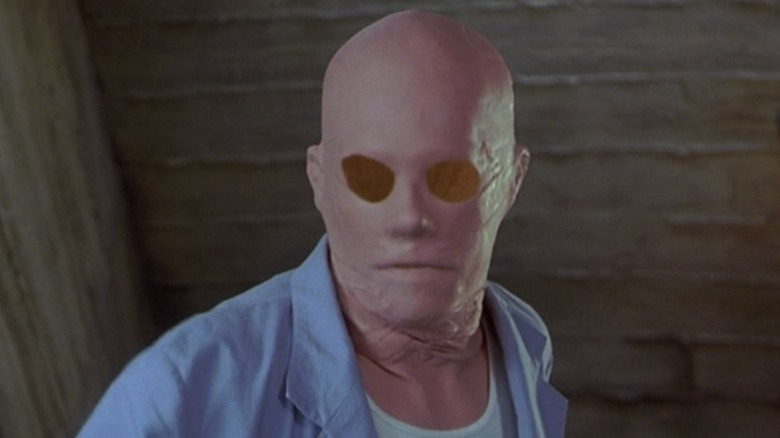
While the placement of the films on the rest of this list can be debated, when ranking Verhoeven's films from worst to best, we have to start here. Based on H.G. Wells' "The Invisible Man," "Hollow Man" was released in the year 2000, and stars Kevin Bacon and Elisabeth Shue. It follows Sebastian Caine (Bacon), a scientist who obtains a formula for invisibility and tests it out on himself. For some reason, this transforms him into a creep, leading to many scenes in which an invisible Caine plays pranks on people, sexually abuses them, and generally makes their lives miserable.
"Hollow Man" is a disappointing film and a lame end to Verhoeven's Hollywood run. It's a jumble of his worst impulses, filled with characters who are evil just for the sake of being evil, with a script that throws in a rape scene when it doesn't know where else to go.
For most of its runtime, "Hollow Man" seems content to go through the motions. It's a film that relies too much on the padding around its larger, eye-catching set pieces, has no curiosity about its premise or its characters and, worst of all, is boring.
Flesh And Blood
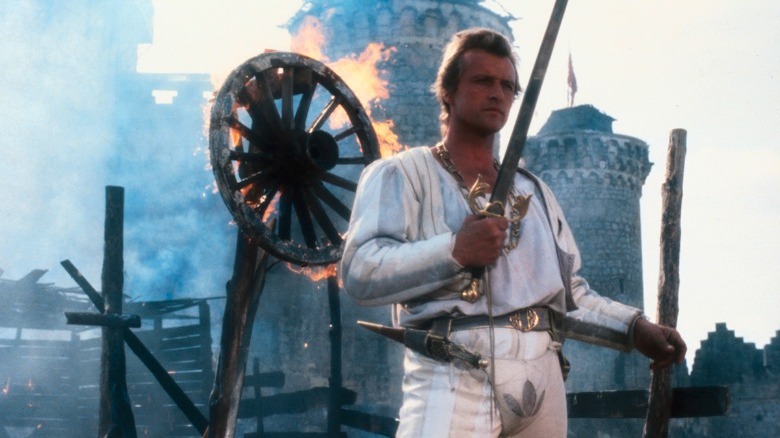
Verhoeven's first English language film is a mixed bag of fantasy cliches and stunning spectacle. Released in 1985, "Flesh and Blood" was another entry into the decade's much-exploited fantasy genre. It tells the story of two warring factions of mercenaries, but despite some great costuming, exciting period details, and well-known actors in the early stages of their careers, it never manages to lift off. To get revenge on his former master, Martin (Rutger Hauer) kidnaps Agnes (Jennifer Jason Leigh), the young woman who is betrothed to his employer's son. A love triangle ensues.
"Flesh and Blood" provides viewers with plenty of sex and violence, which isn't a bad thing in and of itself, but there's nothing else to support this story. There's a clear beginning, but a jumble of action in the middle, and it all leads to a forgettable ending. Half an hour into the film, once all the plot was set into motion, I found myself wishing for characters to root for and more structure for the villains and heroes.
Tricked
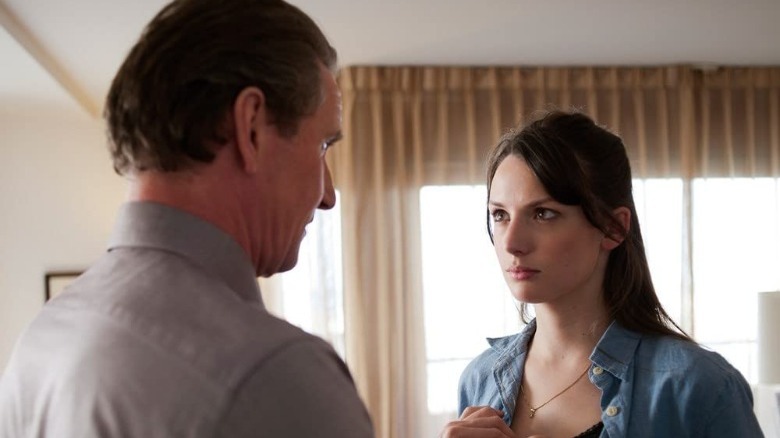
Released in 2012, "Tricked" came out during the era when Verhoeven was best remembered for his post-'90s movies, before "Elle" achieved international critical acclaim. It's amongst Verhoeven's most restrained films, and while it doesn't feel as distinct as the rest of his work, he accomplished a lot by sticking to something relatively simple. As such, "Tricked" represents a step towards bigger, weirder, and more thought-provoking films.
Despite the fact that there's a pretty traditional movie hidden underneath, "Tricked" is still knotty and experimental. The film has two parts: One is a standard narrative film, with a script crowdsourced from its audience, and one is a documentary that provides a behind-the-scenes look at Verhoeven's filmmaking process. The documentary section provides some context for the unconventional screenplay, but it's nothing memorable. The fictional half follows Remco (Peter Blok) a man who, during his 50th birthday party, gets a visit from his pregnant former mistress (Sallie Harmsen). Cue the dissolution of his marriage and a variety of enjoyable twists and turns, all of which are revealed in delightful fashion.
Soldier Of Orange
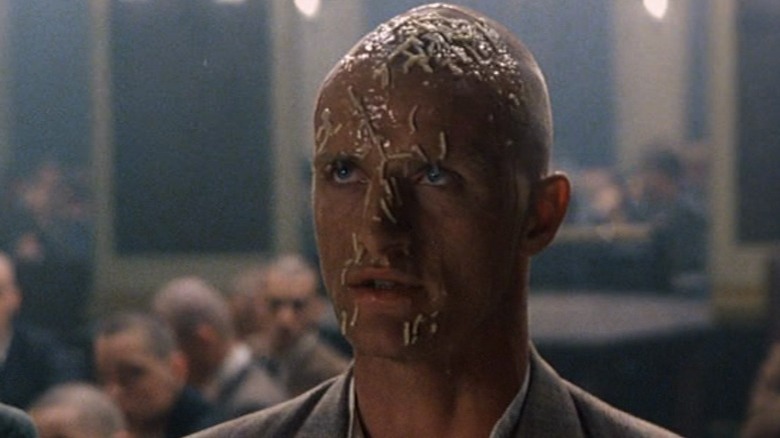
Verhoeven's work in Dutch cinema is groundbreaking. His early work includes some of the country's most expensive and revered films, including many projects that broke box office records and pushed the boundaries of the nation's cinematic efforts. "Soldier of Orange" was the most expensive Dutch film ever made at the time, and the one that facilitated Verhoeven's transition to Hollywood, being his first true international hit.
Set during World War II, the film tackles the Nazi occupation of the Netherlands, following a group of Dutch students who join the country's resistance group. Among them is Erik, intriguingly played by Rutger Hauer, who takes an unheroic approach to a character who, in Hollywood, would have been just another hero.
Soldier of Orange" is a relatively straight-laced war film. Aside from some unintentionally funny and strange moments — at one point, a young woman's crushes flies with a pencil; at another, friends cover each other in soup — it's one of Verhoeven's most restrained efforts, and basically what you'd expect from a prestigious war film. Still, by following a group of friends over the years, Verhoeven finds the pulse for this story, showing us how these relationships build and then collapse while using the war as a backdrop. Unlike many other biopics, "Soldier of Orange" takes a national hero and portrays him as a deeply flawed person.
The Fourth Man
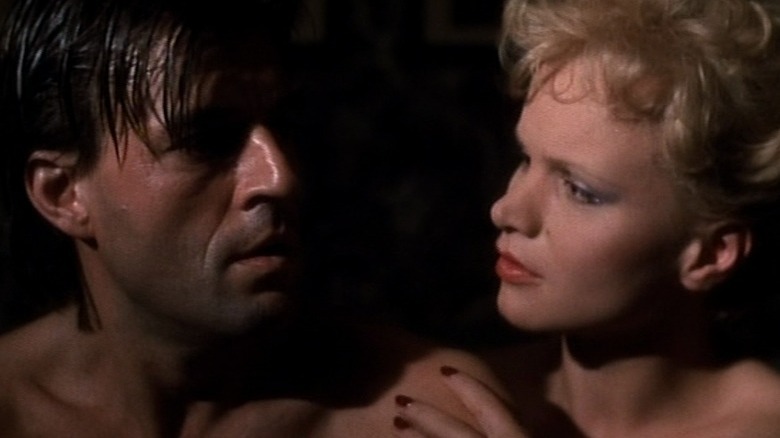
Like the best auteurs, Verhoeven knows what he's into. While he is able to control his impulses when the script and subject matter call for it, "The Fourth Man" gives Verhoeven free rein to be as scandalous as he wants, and he takes the opportunity to fill every frame with religious imagery, sex, dangerous women, and some very sleazy guys.
"The Fourth Man" is eerily similar to "Basic Instinct," yet it doesn't reach those same highs, even if it's more fluid and European. The film follows Gerard, a writer who quickly grows entangled with a beautiful blonde, Christine, who may or may not have murdered her previous three husbands. As Gerard and Christine start sleeping with each other, Gerard becomes obsessed with Christine's other lover, Herman. It's all very convoluted. While the film is consistently entertaining and manages to occupy an intriguing space between an art project and a porn film, it's ultimately more about style than substance.
Keetje Tippel
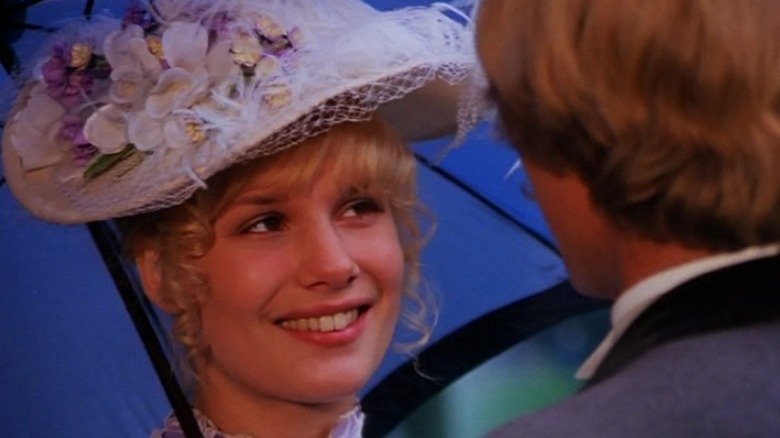
"Keetje Tippel," Verhoeven's third film, boasts plenty of elements that would later become staples of his career. Set in the 1800s, the film follows Keetje (Monique van der Ven), a woman from a poor family who dreams of a better life. Then, Ketjee meets Hugo (Rutger Hauer) and falls in love with him, seeing him as the salvation from her struggles. As tends to happen in these kinds of films — and in Verhoeven's work in general — the road to happiness is never easy, often paved with sexual threats and abject misery.
"Keetje Tippel" meanders, but not always in unwelcome directions. For a period film that centers on a woman, it's a pretty unique movie, with Verhoeven treating Keetje as a character who's fully three-dimensional and worth having her own story. It's also unafraid to go to some dark places.
As a director, Verhoeven often makes you question —both as a viewer, and even more as a woman — why his films are so enamored with sexual violence. Is it a personal fixation for Verhoeven, or a reflection of how he sees the world at large? There are valid arguments for both of these viewpoints. Despite how troublesome his work can be, if there are unifying threads in Verhoeven's filmography, they're the consistency of his female characters and his reluctance to provide the audience with simple answers.
Spetters
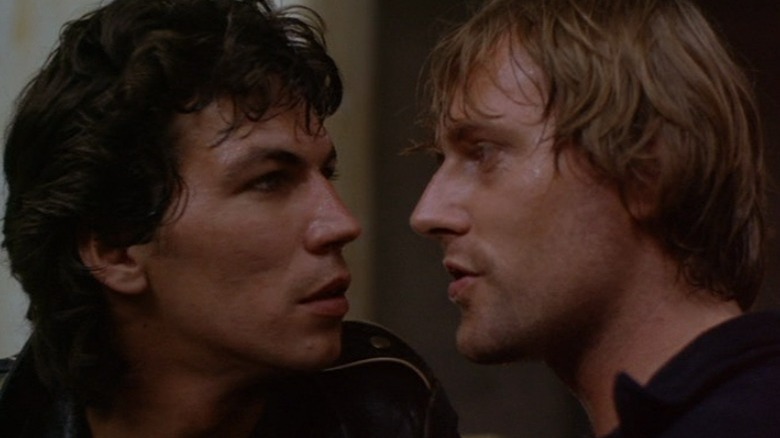
"Spetters," which roughly translates to both "Hunks" and "Splatters," is another coming-of-age story from Verhoeven, and his fifth Dutch film. It's also the project that made him leave the Netherlands, forcing him to seek refuge in Hollywood for two decades. Playing like a grimy and more elevated take on "Grease," "Spetters" is a film filled with men trying to come to terms with their masculinity, and with women questioning the role and the burden of their sex.
"Spetters" follows three friends and the object of their affection, a girl who works a hot dog stand at the motorcycle races they constantly attend. Released in 1980, "Spetters" tackles hot button issues like sex, homosexuality, and misogyny. However, unlike its American counterparts, this is a film that's unafraid of nudity or violence, and features many scenes that made audience members uncomfortable upon its release.
Really uncomfortable. At the time, "Spetters" was accused of championing misogyny and homophobia, and features rape scenes (we really should start keeping a tally) and other depictions of horrible behavior. Ironically, while the film's poor public image pushed Verhoeven towards Hollywood, "Spetters" ended up being a big box office success.
Business Is Business
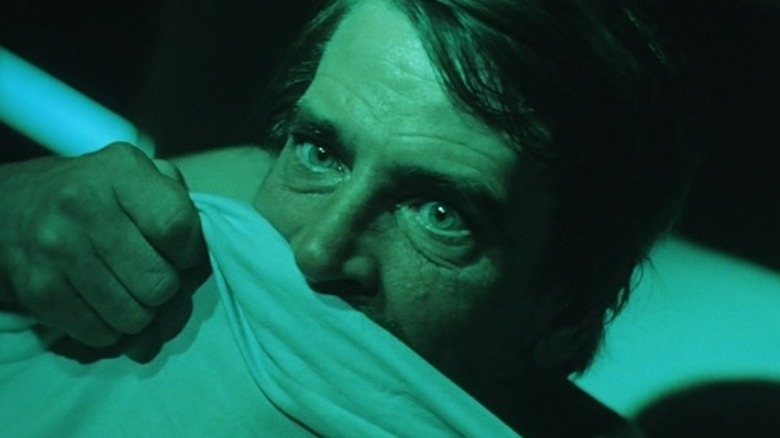
After working in TV and making documentaries, Verhoeven got the chance to direct his first feature film, which was released in 1971. "Business Is Business" is an incredibly solid debut, following Greet (Ronnie Beerman) and Nel (Sylvia de Leur), two prostitutes working in Amsterdam's Red Light district, as they deal with the men they encounter in their work and their personal lives.
While deceptively packaged as a lighthearted comedy with plenty of slapstick elements, "Business Is Business" was revolutionary at the time of its debut and still feels that way, particularly in its non-judgmental approach to sex and sex work. While Greet and Nel face many challenges and endure numerous humiliations from the men in their lives, they're not ashamed of anything. "Business Is Business" is a clear precursor to some of Verhoeven's best and most memorable work, which often features women who, whether they're dancing on stage or plotting elaborate murders, are utterly unapologetic.
Turkish Delight
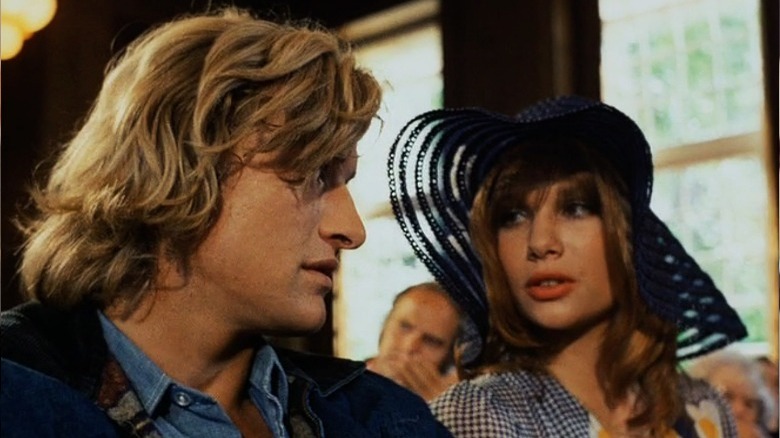
"Turkish Delight" is considered the most successful Dutch film in history, and yet it played in porn theaters in the United States, a statement that I find sad and telling about our culture. It was also Verhoeven's second film, and the start of his partnership with Rutger Hauer, a relationship that lasted until they both transitioned to Hollywood and parted ways.
The film follows the troubled romance between Eric (Hauer) and Olga (Monique van der Ven), which travels to some violent and dramatic places. It's a film that's clearly a product of its time, a riff on "Love Story" and "The Last Tango in Paris," except that the lead hero has few redeeming qualities, something that the director and star both seem to understand. Despite the tonal dissonance between the violence and its more cloying scenes, "Turkish Delight" is one of Verhoeven's most moving and sincere films. After watching it, you might see Hauer as more than the replicant from "Blade Runner." Just imagine a world in which he became one of Hollywood's most exciting leading men!
Benedetta
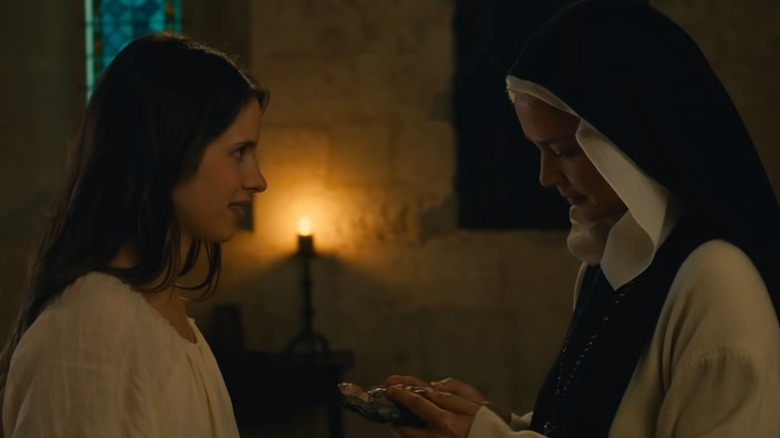
"Benedetta" is Verhoeven's most recent film, and perhaps the one in which his impulses are the least restrained. Here, the sex, violence, and hilarity are dialed up to an 11, which is even more striking considering that it's a film about lesbian nuns. As the titular nun (Virginie Efira) grows up, she develops a strange understanding of sex. That's complicated even further by her charged dreams and premonitions, which peak with the arrival of Bartolomea (Daphne Patakia), a poor girl who Benedetta rescues out of pity. The two quickly fall in lust; Bartolomea is the perfect vessel for Benedetta's pleasure, which, according to the hunky Jesus of her dreams, doubles as her path to divinity.
While violent and gleefully obscene, "Benedetta" can also be sweet and sincere. It's a perfect encapsulation of Verhoeven, who is perhaps the one director who'd dare to make a dildo crafted out of a Virgin Mary statuette an important plot point. "Benedetta" criticizes priests and hypocrites, but it doesn't push an anti-Catholic agenda. Despite the memorable sex toy, it also can't be categorized as nunsploitation. Like Benedetta herself, the film contains multitudes; while its approach to faith might be unorthodox, it's a film that takes God seriously.
Black Book
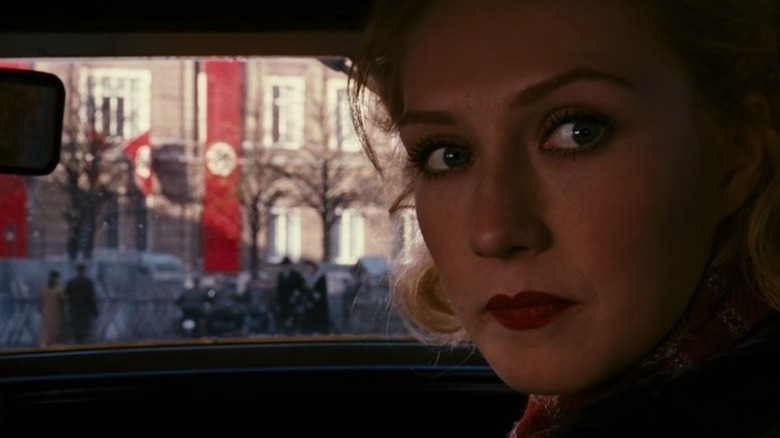
Many years after "Soldier of Orange," Verhoeven returned return to World War II to address the Nazi occupation of the Netherlands from a new angle. While less popular than "Orange," "Black Book" is better.
Rachel Stein (Carice van Houten) is a Dutch jew who joins the resistance after witnessing the murder of her family. As part of her duties, Rachel sings in a cabaret and is tasked with seducing and spying on Nazis, unwisely falling in love with one of them. Like the best of Verhoeven's heroines, Stein is luminous and fearless, and van Houten delivers a committed performance that makes "Black Book" one of the most memorable entries on this list, even if it's not as well-known as many of them.
The film is overflowing with ideas. It's a Holocaust film, an erotic thriller, a war film, and perhaps more, never getting too comfortable with each genre. When the film begins to become too gloomy, it pivots. When you get too comfortable, the script unleashes a gut punch. It's a perfect example of Verhoeven's talents as an entertainer, and proves that he's also capable of thoughtful and moving work.
Robocop
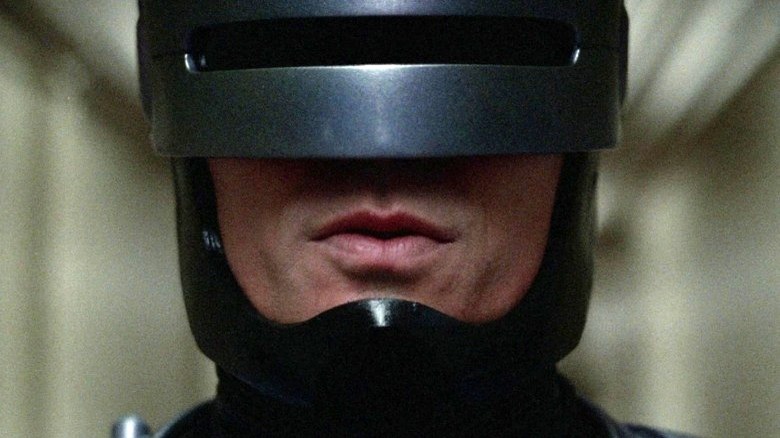
"Robocop" was Verhoeven's second English-language film, following "Flesh and Blood." That Verhoeven got the chance to direct a big-budget action movie after that box office flop is certainly a comment on the state of Hollywood in the '80s. "Robocop" stars Peter Weller as Alex Murphy, a police officer who is transferred to one of the most dangerous precincts in Detroit. On his first day on the job, Murphy is killed by a gang of violent criminals, enabling the OMNI corporation to take his body and turn it into the perfect cop, a cyborg who obeys the law and has the skill set of the Terminator.
"Robocop" is an intelligent, funny, and sad film, one that deviates from the action film formula of the '80s. Through its runtime, "Robocop" is intercut with fake commercials. This is the type of wiliness that makes Verhoeven the right choice for director — he's an outsider capable of seeing America's obsession with consumerism from an unobstructed view.
And yet, despite the villains who plague the film, "Robocop" never forgets its lead character's pain; Murphy, who dreams of both his lost family and the people who murdered him, is unable to fully experience his emotions, even if he can't get rid of them. Watching "Robocop" in the '80s, the time of Schwarzenegger and Stallone, must have felt like watching "The Matrix Resurrections" does now: It's a blockbuster with a giant budget that did the exact opposite of what everyone expected.
Showgirls
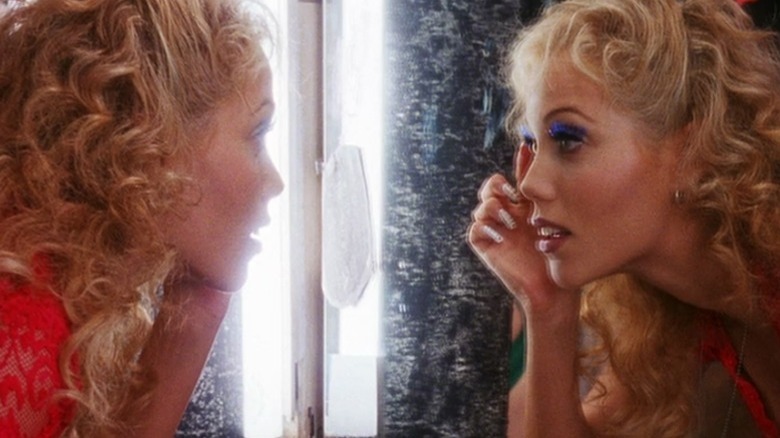
There's no better way to discuss "Showgirls" than with this Gina Gershon quote: "I thought I was doing a Wagner concert," she told The Daily Beast, "[and] realized this is going to be a Britney Spears show." While serious in its execution, "Showgirls" is completely and unintentionally hilarious, from Elizabeth Berkley's over-the-top performance to all of the thrusting we're subjected to during its 131-minute runtime.
"Showgirls" is an alternate take on "All About Eve" about Nomi (Berkley), an aggressive girl with a mysterious past who goes to Vegas to achieve her dream of becoming a showgirl. There, she becomes entangled with Cristal (Gershon), the lead dancer of the biggest show in town, and her boyfriend (Kyle McLachlan).
"Showgirls" has an ambitious scope, with a script populated by dozens of characters and lots of complex sequences. Despite the much-discussed sex scenes and nudity, "Showgirls" is a gorgeous film, filled with bright colors and luscious sets. It appreciates the athleticism of its dancers, even as it depicts their world as ruthless and opportunistic. It's remarkably dated ("Showgirls" is often racist and misogynist), but there are layers within it. "Showgirls" is a project that was clearly made by men, yet it's also a film where the most important bonds are the ones that exist between women. They're dancers with dreams, motivations, and inner worlds that the men in the film can't even begin to grasp.
Total Recall
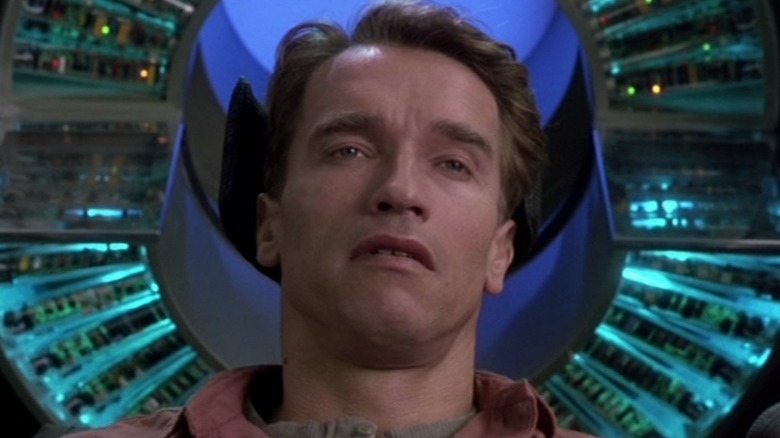
After the tremendous success of "Robocop," Verhoeven found himself relegated to a bit of a sci-fi niche. Still, Arnold Schwarzenegger was a big fan of the director's dystopian action flick, and quickly hired Verhoeven to helm "Total Recall," based on a Philip K. Dick short story. It's a film that could have followed in the more serious footsteps of another Dick adaptation, "Blade Runner," or its own source material. However, Verhoeven chose an alternate route, using Schwarzenegger's unique appeal and his strange sense of humor to the film's advantage.
Blurring the line between reality and fiction, "Total Recall" follows Douglas Quaid (Schwarzenegger), a bored construction worker, who, while trying to add some spice to his life, is implanted with memories of a trip to Mars despite never actually making the voyage. Things go wrong during the operation and reality is split in two, resulting in some truly mind-bending stuff — this is the type of film that keeps people talking about it long after it's over. With some of the best practical effects ever captured on camera, "Total Recall" is the perfect example of a blockbuster that has its cake and eats it, too; it's filled with action and gore that makes it feel like a guilty pleasure, but it's built on the back of a genuinely intriguing premise.
Starship Troopers
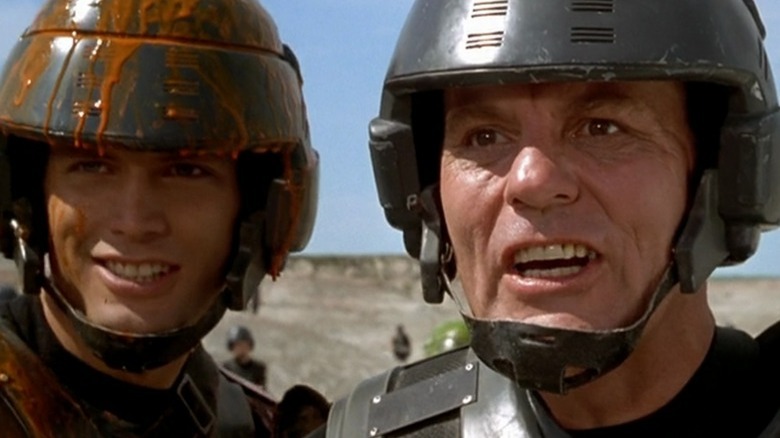
"Starship Troopers" is one of the few book-to-film adaptations in which the plot remains relatively the same, but the soul of the story is completely transformed. Verhoeven doesn't have any loyalty to the book at all; as he told Empire, he didn't even read it. He took Heinlen's novel, which is a sort of expanded, sci-fi military brochure, and subverted it by injecting it with self-awareness.
Underneath it all, "Starship Troopers" is kind of like a high school love story. The film follows a group of friends who join the military and climb its ranks as humanity fights a war against an alien species known as the "Bugs." The protagonist is Johnny Rico (Casper Van Dien), an idiot who enlists in the army to chase a girl. The script is filled with these sort of details — impossibly high stakes that contrast with the characters' dumb actions and other silly things.
In the process, Verhoeven elevates the novel, which dehumanized humanity's enemies and glorified war, by giving the army paralells with the Nazis and populating the film with the type of military propaganda that we regularly encounter in the United States. While widely misunderstood at the time of its release — somehow, American audiences took the satire at face value — nowadays, "Starship Troopers" is largely considered to be Verhoeven's masterpiece.
Elle
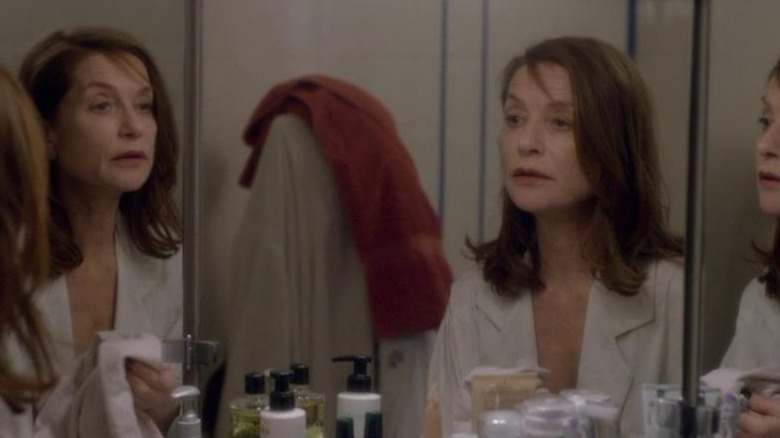
"Elle" is a film that opens mid-rape and slowly transforms into a story of self-discovery. What starts off as a thriller turns into a drama, and then a comedy, until it all comes together into something completely unique yet surprisingly cohesive. Over time, our lead character, Elle (Isabelle Huppert), becomes obsessed with the man who raped her. Huppert's performance paints Elle as someone who is visibly shocked, yet who refuses to pause her life or to view herself as a victim. As the film develops and male characters start to appear, Elle begins receiving mysterious text messages that push her to both protect herself and to try to catch her assailant. Despite all of the moving pieces, Verhoeven and Huppert are in synch, both entranced by the lead character and her psychology.
"Elle" is the type of film that shouldn't work, and perhaps it wouldn't with a different actress or director. As it stands, it's an almost perfect bit of alchemy. Watching it makes for an experience that's both horrifying and hilarious, with plenty of things to say about the nature of men, women, consent, and power.
Basic Instinct
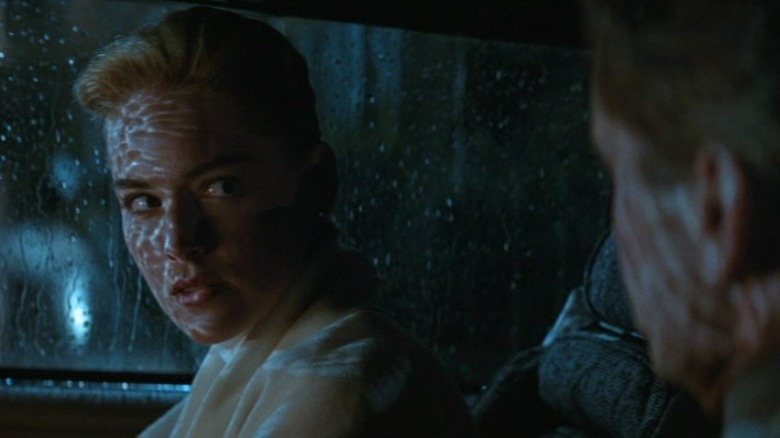
With a swoony score and one of the most memorable lead characters of all time, "Basic Instinct" is the stuff of Hollywood legend. It's a film that's been endlessly replicated, and served as the blueprint for the modern erotic thriller. Here, Verhoeven takes his cues from Hitchcock, stealing the doubles, the blondes, the spooky staircases, and the San Francisco landscapes from "Vertigo" and its ilk, resulting in a film that's brazen, violent, and incredibly horny. It's so good.
"Basic Instinct" stars Michael Douglas as Nick Curran, a troubled policeman who is investigating the killing of a rock star. As the case ramps up, one of the first names on the list of suspects is Catherine Tramell (Sharon Stone), the dead musician's sometimes-girlfriend who wrote a novel featuring an identical murder. Nick and Catherine start having sex, and soon become involved in a complex game; the winner isn't revealed until the very last shot.
"Basic Instinct" perfected the balance of violence and the sex that the erotic thriller demands, creating an entire genre of films that were incredibly profitable. While Sharon Stone's work is indelible and the character that she crafts is a Hollywood landmark, the real star of "Basic Instinct" is, as always, Verhoeven and his craft.
Read this next: Sci-Fi Box Office Bombs That Deserve A Second Chance
The post Every Paul Verhoeven Movie Ranked From Worst To Best appeared first on /Film.